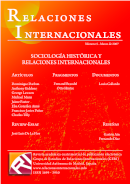Copyright (c) 2007 Lucía GALLARDO

This work is licensed under a Creative Commons Attribution-NonCommercial-NoDerivatives 4.0 International License.
Abstract
The concept of ecological debt was first presented at the Earth Summit in Rio de Janeiro in 1992 by the Institute of Political Ecology of Chile. Initially, the concept of ecological debt was strictly linked to environmental destruction, caused mainly by the neoliberal development model, export trade and financial economics. It is, therefore, a modern concept that evokes the external debt crisis and the visibility of the social, environmental and economic impacts it causes on impoverished economies.
In this effort to link ecological debt and migration, we will place it within the logic of the world capitalist system. Therefore, we do not want to address the migration issue as the result of internal policy of a specific country or region, but as a product of a historically unequal structure of access and distribution of benefits between the countries of the centre and their peripheries. We will also locate the migratory process within the racial matrix that is, at the same time, the constitutive of European modernity. Therefore, one of the approaches used will be that of distributive justice.

